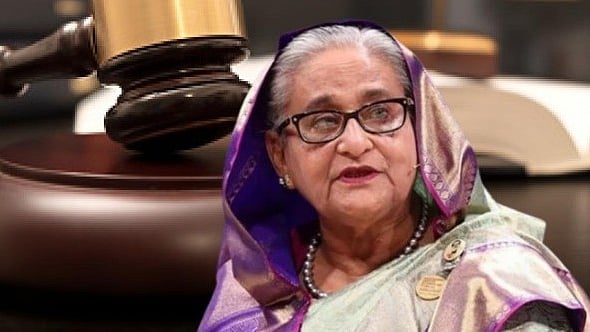World
Former Bangladesh PM Sheikh Hasina sentenced to death for 'crimes against humanity'
International Crimes Tribunal also convicts former home minister Asaduzzaman Khan Kamal and ex-inspector general of police Chowdhury Abdullah Al-Mamun

Bangladesh finds itself in the eye of a storm as its International Crimes Tribunal (ICT) on Monday delivered a historic and unprecedented judgment, convicting former prime minister Sheikh Hasina and her two senior aides, former Home minister Asaduzzaman Khan Kamal and ex-inspector general of police Chowdhury Abdullah Al-Mamun, on charges of crimes against humanity linked to the violent July demonstrations of last year.
In a momentous verdict, Hasina was sentenced to death, while Mamun —who has pleaded guilty and turned state witness, becoming the first accused to do so since the tribunal’s inception in 2010 — was granted a pardon, though the court indicated he would face a “lenient sentence” given the gravity of his involvement. Asaduzzaman, however, remains a fugitive, and the final sentencing for Hasina is still being read out from the 453-page judgment.
In a verdict following a months-long trial, Bangladesh’s ICT labeled 78-year-old Awami League leader Sheikh Hasina as the “mastermind and principal architect” behind the violent crackdown that claimed hundreds of lives during last July’s protests.
The tribunal’s proceedings were broadcast live by Bangladesh Television (BTV), offering the nation a rare window into the deliberations of Tribunal-1, led by justice Md Golam Mortuza Majumder. The formal charge documents, sprawling over 8,747 pages, contained exhaustive evidence, references, and a comprehensive list of victims, underscoring the scale and seriousness of the accusations.
Published: undefined
On Monday, Sheikh Hasina claimed the verdict against her came from a “rigged tribunal” established and led by the unelected interim government of Muhammad Yunus, denouncing the ruling as “biased” and “politically motivated”.
The prosecutors pressed five counts against the accused, including failure to prevent murder — a charge that qualifies as a crime against humanity under Bangladeshi law — and sought both the death penalty and confiscation of assets for redistribution to victims’ families. Hasina, steadfast, has consistently denied all charges and refrained from returning to the country to face trial.
As the verdict reverberates across Dhaka, the city is gripped by an extraordinary security lockdown. Dhaka metropolitan police commissioner Sheikh Md Sajjat Ali issued a “shoot-at-sight” directive on Sunday evening, aimed at deterring arson, cocktail bomb attacks, and any threats to civilians or law enforcement, as the Awami League’s two-day strike on 16–17 November coincides with heightened unrest. In a flurry of enforcement action, at least 21 Awami League leaders and workers — barred from political activity — were detained across Narayanganj in the past 36 hours, reflecting the authorities’ resolve to maintain order amid the politically charged atmosphere.
The country stands at a tense crossroads, as a verdict of such magnitude casts long shadows over Dhaka’s streets, its political landscape, and the fragile balance of law, order, and public sentiment.
With agency inputs
Published: undefined
Follow us on: Facebook, Twitter, Google News, Instagram
Join our official telegram channel (@nationalherald) and stay updated with the latest headlines
Published: undefined